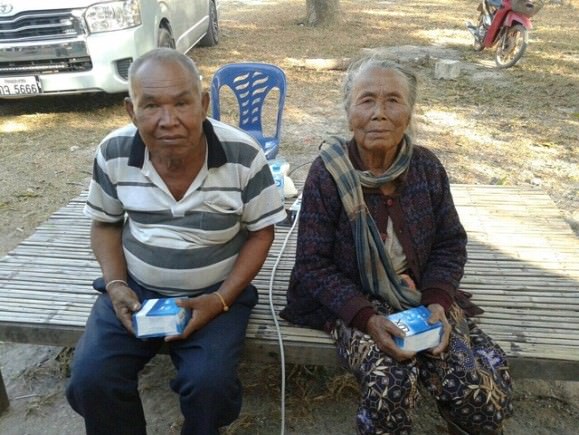
March 2019 to December 2022
Lead research institution: Lao Tropical and Public Health Institute (TPHI), Ministry of Health, Lao People’s Democratic Republic
Participating institutions: Lao National Health Insurance Bureau, The World Bank, Nagoya University Graduate School of Medicine
Principal investigator: Dr Sengchanh Kounnavong, Lao TPHI
Lao People’s Democratic Republic
Background
In Lao People's Democratic Republic, the prevalence of cognitive impairment is unknown. The Lao Tropical and Public Health Institute (TPHI) validated the Lao language assessment tool of cognitive function (revised Hasegawa’s Dementia Scale). HDS-R is an assessment tool for cognitive decline developed in 1974 by Japanese neurologists and has been broadly used in Japan as a simple screening tool applied in daily clinical settings. It consists of 9 questions with a maximum score of 30 and cut-off point of 20 to suspect cognitive decline [1]. A Lao language version of HDS-R was developed and validated in 2017 by the National Institute of Public Health, Ministry of Health, Lao People’s Democratic Republic [2]. Using this tool, a survey was conducted to describe the prevalence of cognitive impairment, available resources for caregivers and local attitudes towards cognitive decline to develop evidence-based policies in Lao People's Democratic Republic.
Goal
To understand the prevalence of cognitive impairment among people 60 years and over and the attendant risk factors in regions of Lao PDR, the available resources for caregiving, and local attitudes towards dementia to better inform public health policies.
Methods
- A community-based cross-sectional prevalence survey about cognitive impairment was carried out among adults ≥60 years of age who resided in six districts of three provinces in Lao PDR representing northern, central, and the southern regions. In total, 2206 individuals aged 60–98 years (1110 men and 1096 women) were interviewed using a pre-tested Lao version of the Revised Hasegawa Dementia Scale (HDS-R) and the WHO STEPwise approach to surveillance for risk factors for noncommunicable diseases (the STEPS survey tool). Adjusted odds ratios (AORs) were estimated using logistic regression models.
- Interviews were conducted among local leaders to gather information about available formal and informal resources for people with cognitive decline, as well as local perspectives on cognitive decline. The study team interviewed health care professionals (HCPs) from three provinces, six districts, and 12 health centers. Village committee members from three leadership groups (village head, Lao women union, and the Lao front) were also interviewed in 70 villages. In total, 182 people participated. The qualitative data were analyzed using the inductive thematic analytic approach.
Results
- 49.3% of respondents (59.0% of which were women) had HDS scores ≦20. In addition to age, the following factors were significantly associated with cognitive impairment: having no formal education relative to those with a university education (Adjusted Odds Ratio = 9.5), living in the northern relative the central region (AOR = 1.4), living in a rural area (AOR = 1.5), needing assistance for self-care (AOR = 1.8) and being underweight (AOR = 1.5). Factors associated with no cognitive impairment among included moderate intensity physical activity lasting for 10 minutes and up to 1 hour (AOR = 0.6) and for more than 1 hour (AOR = 0.6).
- None of the HCPs interviewed had experience with assessment of cognitive decline. HCPs reported the need for advocacy and public awareness for the people with cognitive decline, which was perceived as a normal part of ageing in most families. HCPs also reported the need for reliable and accessible training for simple assessment tool for cognitive decline as well as capacity to follow-up.
Global Implications
There is a need to strengthen health systems to support the needs of populations as they age to progressively attain universal health coverage (UHC). As populations age, health workers and communities should understand the difference between normal ageing related memory loss and cognitive decline. Given limited resources in low- and middle-income countries, innovative approaches for capacity building and awareness are needed. Simple tools can be applied in limited resource settings with a short training to increase awareness among the public, healthcare professionals and government officials.
Local implications
The Kansai region of Japan embarked on the Kobe Dementia Study in which a simple tool has been used to identify high risk populations for cognitive decline [3]. This could be applied in resource limited settings, and may be useful for other countries that wish to identify cognitive decline.
References
- Imai Y., Hasegawa K. The revised Hasegawa’s Dementia Scale (HDS-R) – Evaluation of its usefulness as a screening test for dementia. J.H.K.C. Psych (1994) 4, SP2, 20-24. https://www.easap.asia/index.php/find-issues/past-issue/item/503-v4n2-9402-p20-24
- Kounnavong S., Soundavong K., et.al. Lao language version of the Revised Hasegawa’s Dementia Scale. Nagoya J. Med Sci. 79. 241-249, 2017. https://www.med.nagoya-u.ac.jp/medlib/nagoya_j_med_sci/792/31_SengchanhKounnavong.pdf
- World Health Organization. “Managing people with cognitive decline: validation of a checklist; WHO Centre for Health Development.” WHO Centre for Health Development, https://extranet.who.int/kobe_centre/sites/default/files/Managing%20people%20with%20cognitive%20decline_validation%20of%20a%20checklist_27%20Sept_slb.pdf
Publication
Kounnavong, S., Vonglokham, M., Sayasone, S. et al. Assessment of cognitive function among adults aged ≥ 60 years using the Revised Hasegawa Dementia Scale: cross-sectional study, Lao People's Democratic Republic. Health Res Policy Sys 20 (Suppl 1), 121 (2022). https://doi.org/10.1186/s12961-022-00919-x
Conference presentations:
Assessment of the cognitive function among adults over 60 years using the Revised Hasegawa’s Dementia Scale: A cross-sectional study in three regions of Lao People’s Democratic Republic. Kounnavong S. 10th Annual Conference of Japanese Society for Dementia Prevention, June 2021, Yokohama, Japan.

